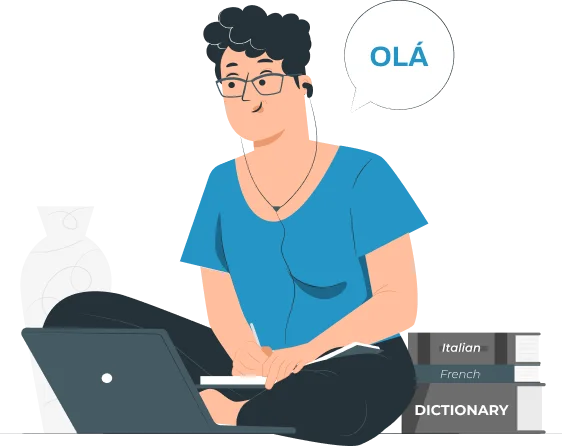We help you reach a wider audience with expert Portuguese website translation services. Our specialized translators localize each element of your website to make it resonate with your target audience.
Portuguese Translation Services
Get your quote

Your Reliable Agency for Portuguese Translations
CCJK is your trusted translation and localization partner with years of experience. Since 2002, we have been providing premium quality Portuguese document translation services to help brands effortlessly tap into the Portuguese market. Our team of experienced translators has linguistic proficiency and industrial experience to provide best-in-class Portuguese translation in the quickest turnaround. All translations are performed by skilled human translators to ensure high quality outcomes, considering the unique requirements of each client.
Our clients
World’s top organizations rely on CCJK
Thrive in the Portuguese Market with Certified Translations
Are you planning to launch your products or services in the Portuguese market? Well, how effectively you communicate with your target customers is going to determine your scalability in the market. To make your brand resonate with customers, you must invest in professional translation services. Our certified English to Portuguese translation services guarantee accuracy, reliability, and legal acceptance in the Portuguese market. Partnering with a reliable Portuguese translation agency like us means you avoid any costly mistakes and ensure your message is clear and impactful.

Let’s Talk About Your Portuguese Translation Project

Get High Quality Portuguese Subtitling Services
We enhance the reach of your video content with our top-notch Portuguese subtitling services. Our skilled linguists create engaging subtitle translations that cater to diverse audiences. Whether it’s a film, documentary, or online video, we deliver precise Portuguese audio translation services and perfect synchronization with existing content. Our services are tailored to meet your needs and ensure maximum accessibility.
Professional Portuguese Translations Tailored for Your Needs
We offer customized Portuguese translation solutions to meet your exact requirements. From technical manuals and legal documents to website content, our expert translators deliver precision and cultural resonance. We approach each project with a tailored strategy to fulfill client specifications.
At CCJK, we provide Portuguese legal translation services done by professionals with good command in legal terminology that ensure your legal documents are translated with 100% accuracy and precision.
We handle your medical documents with care and provide best-in-class Portuguese medical translation services. From clinical trial reports to patient informed consent documents, we’ve all your medical translation needs covered.
We offer consistent and culturally nuanced IT translation services for your technical documentation, user manuals, API files, etc. Get Portuguese certified translation services for your software localization and stay ahead of the competition.
Get Your Free Translation Quote
Hire the Best Portuguese Interpreter
Our interpreters at CCJK are well-trained to convey your message precisely to the Portuguese-speaking audience. We have interpreters from diverse industries, and they have the experience of working in different settings. Get premium quality Portuguese interpreting services for business meetings, seminars, legal trials, medical appointments, etc. Contact us now to hire the best resources for remote and onsite interpretations.

Why Choose CCJK as Your Portuguese Translation Agency
We deliver projects within deadlines without compromising quality. Our advanced translation tools and optimized workflows allow us to handle high volumes of content efficiently. We are a trustworthy Portuguese translation company to get the best English to Portuguese and Portuguese to English translation services at competitive rates.

Certified Portuguese Translators
Our translators have language proficiency with an in-depth understanding of different Portuguese dialects and local culture. With expertise in various domains, our professional translators deliver culturally appropriate translations.

Quality Management
Our rigorous editing and proofreading processes guarantee consistent and error-free translations. We utilize advanced translation tools and technologies to enhance efficiency and accuracy.

Fast Delivery
Our efficient project management system and dedicated team ensure quick turnaround times without compromising quality. Whether you need European or Brazilian Portuguese translation services, we offer quick service, giving you the flexibility you need for urgent projects.

Affordable Pricing
We tailor our pricing structure to meet client budgets and project requirements without sacrificing quality. Our pricing is transparent, and we offer flexible options for payment to accommodate your needs.
Communicate with your Portuguese Customers Seamlessly
Portuguese Language Variations
Portuguese is spoken by around 250 million people globally, and the language variations reflect the cultural diversity of the Portuguese. It is crucial to understand the difference between these dialects for effective localization.
| Dialects | Regions | Characteristics |
|---|---|---|
European Portuguese |
Portugal, including the Azores and Madeira |
Considered the standard variety, influenced by Latin and Galician. |
Brazilian Portuguese |
Brazil |
Significant variations in vocabulary, pronunciation, and grammar compared to European Portuguese. It is influenced by African and indigenous languages. |
Mirandese |
Northern Portugal |
A minority language with official status, closely related to Portuguese. |
Afro-Brazilian Portuguese |
Brazil (especially coastal areas) |
Dialect influenced by African languages, with unique vocabulary and pronunciation. |
Meet Our Professional Portuguese Translators

Marta Silva
Marta Silva is an experienced translator specializing in English to Portuguese translations. She has a strong background in legal documents, ensuring accuracy and confidentiality. Marta’s meticulous attention to detail guarantees precise and reliable translations.

Ricardo Oliveira
Ricardo Oliveira is a seasoned translator, proficient in Spanish to Portuguese translations. With expertise in the medical field, he excels in translating medical reports, research papers, and pharmaceutical documents with high accuracy and clarity.

Isabela Pereira
Isabela Pereira is a skilled translator with a focus on Portuguese to French translations. Her extensive experience in the tourism and hospitality industry allows her to deliver engaging and culturally nuanced content, enhancing the client experience.

Tiago Fernandes
Tiago Fernandes is an expert in Portuguese-German translations, specializing in technical and engineering documents. His in-depth knowledge of industry-specific terminology ensures precise and professional translations for complex technical content.
Clients Testimonials
Our marketing campaign required flawless English to Portuguese translations, and CCJK delivered beyond expectations. Their ability to maintain the tone and message of our content was remarkable. Excellent service!
Julia Evans, Marketing DirectorCCJK's technical translation services were top-notch. Tiago Fernandes ensured our engineering manuals were accurately translated from Portuguese to German. Their industry-specific knowledge is truly impressive. Highly satisfied!
Michael Harris, Engineering Project ManagerWe hired CCJK for Portuguese to French translations for our travel brochures. Their culturally nuanced and engaging translations significantly improved our client experience. Their professionalism is unmatched. Great job!
Anna Rodriguez, Travel Agency ManagerCCJK provided us with precise and thorough Portuguese translations of our medical reports. Their expertise in the medical field truly shone through. We highly recommend their medical translations.
Carlos Mendes, Medical Research AnalystCCJK provided exceptional Portuguese translation services for our legal documents. Their attention to detail and confidentiality were outstanding. We couldn't have asked for a more reliable partner. Highly recommended!
Emma Thompson, Legal ConsultantFAQs
frequently asked questions

Do you provide revisions for the translated content?
We prioritize content quality and client satisfaction above anything else. Projects can sometimes require adjustments based on client feedback. Our clients can contact us anytime for translation revisions to meet their goals.
Can you provide references or case studies for similar translation projects?
Yes, we can provide references and case studies for similar translation projects. Please check out this page or contact us directly, and we’ll be happy to share relevant examples that highlight our experience and success in handling projects like yours.
How do you handle confidentiality and data security?
We take proper security measures to keep our client data confidential. All the translators involved are required to sign an NDA before working on your project. We use secure methods to transfer our documents, and only authorized personnel are able to access client files.
How do you maintain language consistency in a large-scale translation project?
In order to effectively manage large-scale projects, we develop a comprehensive style guide with terminology and determine the right tone for the target audience. It reduces the chances of inconsistency and variations throughout the translation project. We also use a centralized TMS to manage people and resources, which confirms that everyone refers to the same resources and project glossaries.
Do you offer industry-specific official Portuguese translation services?
Yes, we offer industry-specific Portuguese translations. Our Portuguese translators are experts in various fields, such as medical, legal, technical, and finance sectors. They always use industry-specific jargon and terminology to ensure your translations are accurate and consistent.
Can I discuss my translation project with someone by phone?
Yes, you can discuss your Portuguese translation project related queries with our sales team and project managers on the phone.
